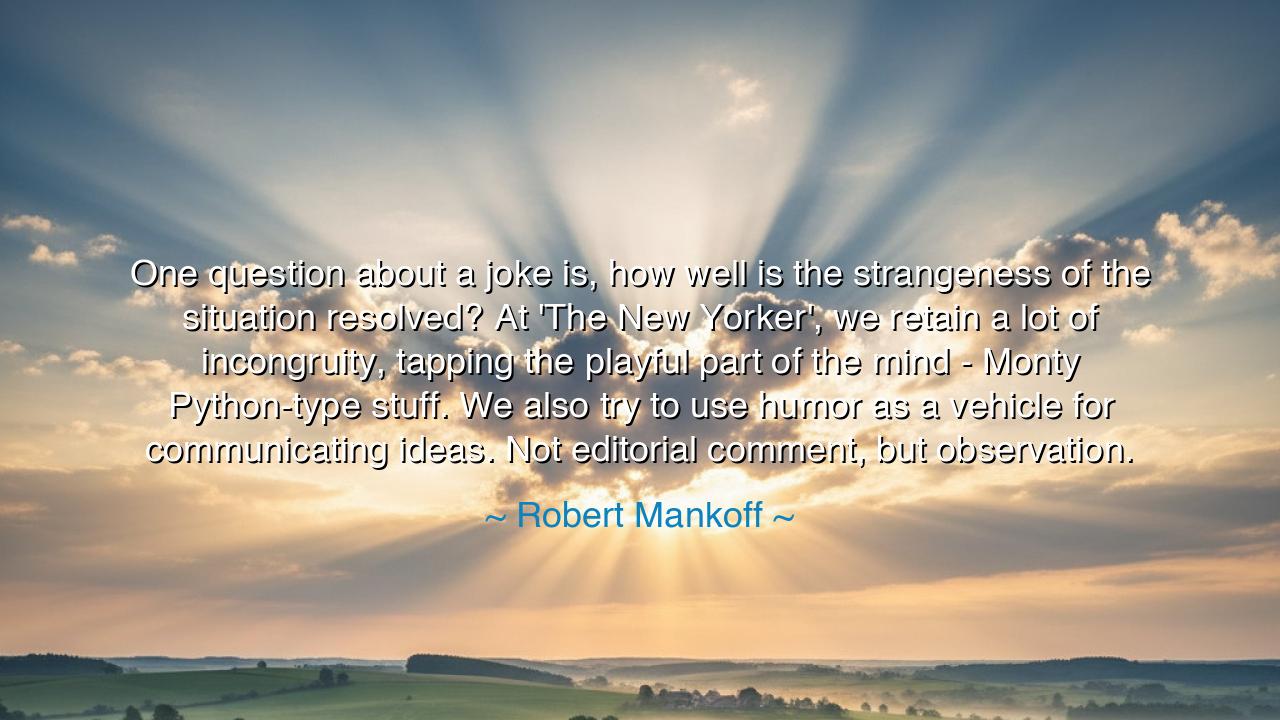
One question about a joke is, how well is the strangeness of the
One question about a joke is, how well is the strangeness of the situation resolved? At 'The New Yorker', we retain a lot of incongruity, tapping the playful part of the mind - Monty Python-type stuff. We also try to use humor as a vehicle for communicating ideas. Not editorial comment, but observation.






In the grand theater of life, there is a truth both deep and revealing, a truth that Robert Mankoff captures with clarity and insight: "One question about a joke is, how well is the strangeness of the situation resolved? At 'The New Yorker', we retain a lot of incongruity, tapping the playful part of the mind - Monty Python-type stuff. We also try to use humor as a vehicle for communicating ideas. Not editorial comment, but observation." This wisdom, though simple on the surface, speaks to a profound understanding of humor, one that transcends mere jest or comedy, and instead aligns itself with the deeper currents of human experience. Mankoff’s reflection suggests that humor, when properly wielded, is not just an act of entertainment, but a method of engagement, a tool for understanding the world’s absurdities, and a means of reflecting upon the truths that lie hidden beneath the surface of everyday life.
In the ancient world, humor was often a vehicle for observation. The great philosophers like Socrates and Aristotle used humor to reveal the contradictions and imperfections of society. For Socrates, humor was a way of unmasking falsehoods, exposing the illogicality of conventional thinking, and leading his listeners toward deeper understanding. His famous method of questioning—Socratic irony—was a form of humor that led his interlocutors to realize the strangeness in their own assumptions. Socrates, though serious in his quest for knowledge, understood that humor, in its most profound form, is about uncovering incongruities, and through this unveiling, we come to understand truths about ourselves and the world.
The humor that Mankoff describes, one rooted in incongruity and strangeness, resonates deeply with the ancient tradition of tragedy and comedy. The great playwright Aristophanes, often known as the father of comedy, filled his works with absurdity and contradiction. In his play The Clouds, he ridicules the sophists of his time, using absurd situations to reveal the irrationality of their arguments and the strangeness of their logic. Like Monty Python, whose humor, though playful, served as a means to expose the absurdities of modern society, Aristophanes used humor as a mirror to reflect the paradoxes of his own time. This same incongruity Mankoff refers to—the collision of the unexpected with the familiar—is the heart of humor that transcends mere laughter and seeks to communicate ideas.
The art of observational humor—where the absurdity of life is revealed through the keen eyes of the observer—has roots in the ancient wisdom of the Stoics. Zeno of Citium, the founder of Stoicism, believed that the universe was full of irrationality, yet it was our ability to observe these contradictions and respond with wisdom that allowed us to live a virtuous life. Humor, in this sense, is a reflection of life’s paradoxes: the things that seem out of place, the contradictions in human behavior, and the discrepancies between what we believe and what we do. The Stoics, though they advocated for serenity in the face of life’s challenges, also understood that humor had the power to clarify life’s deeper lessons, allowing us to see the world not as we wish it to be, but as it truly is—strange, chaotic, and sometimes absurd.
Mankoff’s humor at The New Yorker works in much the same way. It is not simply a form of commentary, but rather a method of observation, one that does not pass judgment but reveals the incongruities of life through the lens of playful absurdity. By retaining the strangeness in situations, Mankoff invites us to laugh not just at the joke, but at the paradoxes of the human condition. This form of humor, much like that of Monty Python, serves as both a mirror and a lens, showing us the truth about the world and inviting us to confront its absurdities with both laughter and understanding.
The lesson that Mankoff imparts is one of balance and clarity. Humor, in its highest form, is not a tool for escape but for illumination. When we laugh at the strangeness of life, we are not merely disengaging from it, but observing it more closely, revealing truths that are often hidden behind the veneer of normalcy. This form of humor is not about editorializing or pontificating; it is about observation, seeing the world as it is, full of contradictions, surprises, and incongruities—and, through this playfulness, finding both meaning and joy.
In our own lives, we must learn to embrace humor as a tool for engagement, not as a means of avoiding life’s challenges, but as a way of understanding them more deeply. Whether in our work, our relationships, or our personal journeys, humor helps us observe the world around us with clarity and playfulness, seeing not only the absurdities but also the deeper truths they reveal. Like Mankoff and the great minds of the past, we must recognize that humor is not just for entertainment, but a vehicle for insight—one that allows us to navigate the strangeness of life with both laughter and wisdom. Let us, therefore, approach the world with eyes wide open, ready to laugh at its incongruities and learn from them, finding in each absurd moment the deeper lessons that make us truly alive.






AAdministratorAdministrator
Welcome, honored guests. Please leave a comment, we will respond soon